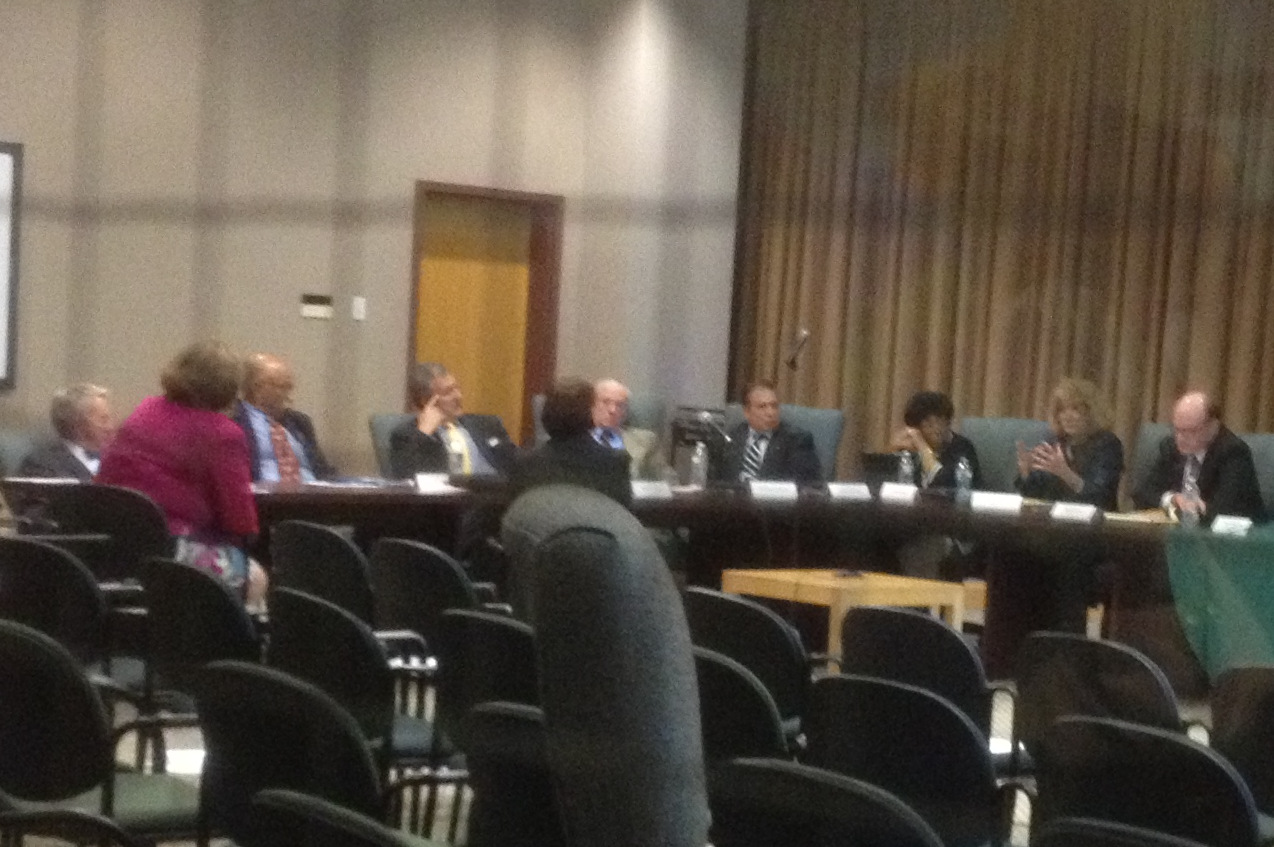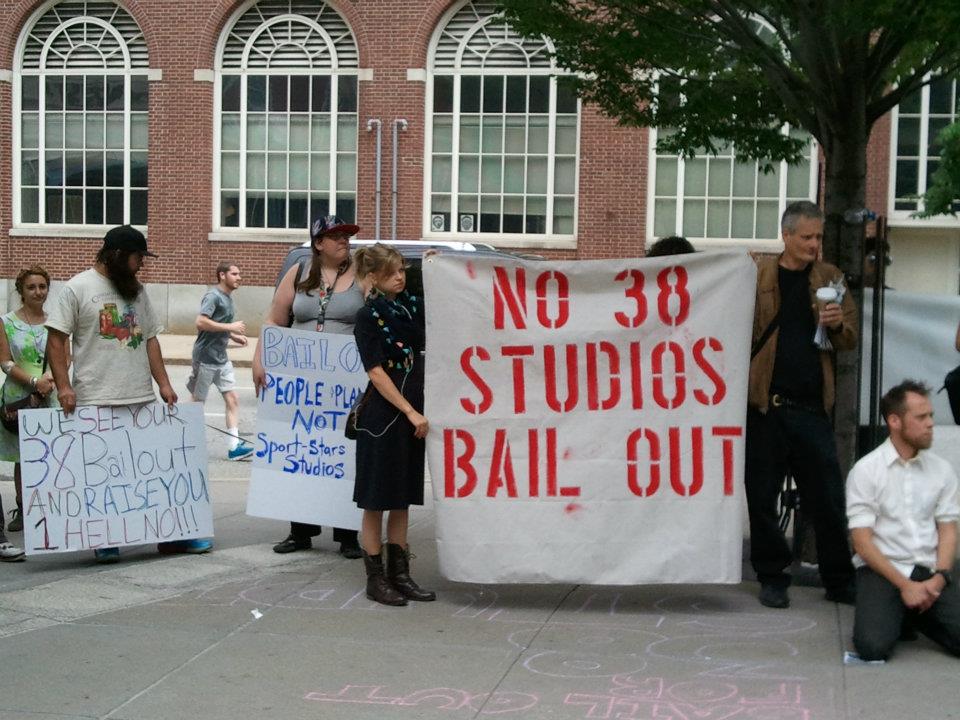 Spent some of the afternoon Thursday discussing the 38 Studios bonds with Elaine Heebner, John Chung, a law professor at Roger Williams, Gary Sasse, the former director of the Rhode Island Public Expenditure Council, Mark Higgins, the dean of the URI Business School, and Bob Cusack, a guy who’s been on one side or the other of the municipal bond market for 35 years. The event was a co-production of the Stephen Hopkins Center for Freedom, Prosperity, and Motherhood and Occupy Providence, and Bill Rappleye of Channel 10 moderated us all.
Spent some of the afternoon Thursday discussing the 38 Studios bonds with Elaine Heebner, John Chung, a law professor at Roger Williams, Gary Sasse, the former director of the Rhode Island Public Expenditure Council, Mark Higgins, the dean of the URI Business School, and Bob Cusack, a guy who’s been on one side or the other of the municipal bond market for 35 years. The event was a co-production of the Stephen Hopkins Center for Freedom, Prosperity, and Motherhood and Occupy Providence, and Bill Rappleye of Channel 10 moderated us all.
You can read WJAR’s account here
News, Weather and Classifieds for Southern New England
There was a surprising amount of skepticism expressed about repaying the bonds.
John Chung started off by endorsing neither paying nor defaulting, but calling for more research to understand exactly what the downside of default would be, a point echoed by Sasse and Higgins. No one was willing to endorse the idea of simply repaying the bonds without knowing more about the downside, which was much farther down the road to skipping the bailout than I’d anticipated.
Bob Cusack then pointed out that the research would actually be pretty easy. He suggested just calling the three bond rating agencies and asking their opinion, and then calling the five biggest buyers of our bonds and asking them whether they’d still buy our bonds. When you call it “research” or “analysis” it sounds forbidding, but when you call it “make a few phone calls” it doesn’t sound so hard. Cusack said he’s hard put to understand why analysis so easy seems not to have been done.
One of my favorite moments came when Bill Rappleye asked whether a compromise could be possible, that might get the cost of this bailout down to a more manageable $50 million. Elaine Heebner pointed out that the rental subsidy program on which she depends (she’s disabled) only costs $1.6 million per year and is threatened by budget cuts. As Everett Dirksen used to say, “A billion here, a billion there, and pretty soon you’re talking about real money.” Our state’s budget is not so flush that we can contemplate any kind of expense in isolation.
But considering it in isolation is precisely what people who say this is an obligation want us to do. This language of “obligation” or even “moral obligation” elevates this expense to make it seem more important than any other state expense. But that’s silly. The legislature’s role is to balance expenses and set priorities. Everyone will rank them differently, no doubt, but discretion is discretion.
When my turn to speak came, I began with a spirited defense of finger-pointing. The people who say we can’t play the “blame game” and should just move on are usually the ones at fault. Finger-pointing and assessing responsibility is how we learn from mistakes. If someone isn’t trustworthy, I want to know that before I trust them again. Some of the most bleakly funny writing I’ve read in the past year is in the complaint Governor Chafee filed against 38 Studio executives, EDC staff members, and several members of the downtown legal establishment. Go read it, and enjoy a laugh about how people we paid a lot of money for their expertise didn’t apply it and just waved this deal through.
Among all the discussion of how defaulting will hurt the bond rating of EDC and possibly of the state, one point hasn’t been made: the damage may have already been done. Any bond investors analyzing some future EDC deal will be aware that in 2010, they really messed up. In other words, knowing what you know now, without knowing whether the state will actually pay these bonds or not, would you buy some future EDC bond? I wouldn’t, and if I can construct an argument that someone shouldn’t, that likely means there has already been a hit to the agency’s bond rating.
The worst part of the whole fiasco was the abuse of a useful lending program. The fact is that the loans EDC was making to other businesses were to address a real failure of the private credit market. Bank credit is too tight now, and perfectly viable businesses cannot find the credit they need to keep afloat. This has been documented in many ways, and the bill that allowed the 38 Studios deal was intended to make operational what had been a successful pilot lending program. This would have been a valuable aid to the state’s economy, but was ruined by people who cared more about headlines than about policy.
So yes, please let’s not waste this money. EDC’s reputation is ruined, but it won’t have been done by defaulting on dumb bonds, but by the “serious people” who thought that trusting a baseball player for his video game expertise was a good idea.
 I’m not entirely certain if this was either ethical or legal to do, but I live tweeted the contract negotiations between the Board of Education and Deborah Gist last night. Well, just the body language of it actually.
I’m not entirely certain if this was either ethical or legal to do, but I live tweeted the contract negotiations between the Board of Education and Deborah Gist last night. Well, just the body language of it actually.



